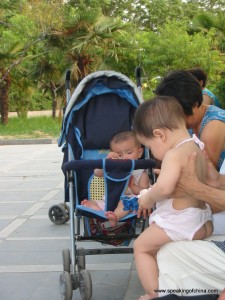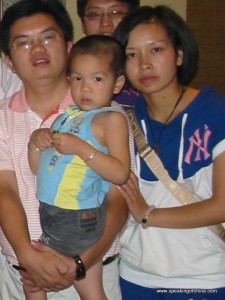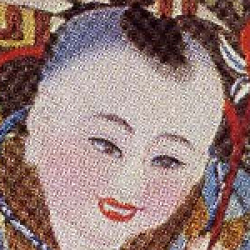
This is the concluding article in a four-part series of articles providing a snapshot of modern life in China in observance of October 1, 2009, the 60th anniversary of the founding of the People’s Republic of China. It was published October 11, 2009 in the Insight section of the Idaho State Journal
————
It was Chinese New Year 2003 when I first met Yu Kaiqi, the boy who would become my nephew. Almost a year old, he was bundled up in endless layers, like a silkworm cocoon — and just as precious to my future father-in-law, Yu Huimin, 61, who carried him everywhere. I was stunned. If this boy were in the US, his parents and grandparents would have been letting him teeter and totter on the floor, taking his first steps to explore the world. But not here. For almost the entire day, he was tucked safely away in his doting grandfather’s arms.
Today, Yu Kaiqi, now seven years old, is still the family’s center of attention — but for all the wrong reasons. Throwing objects at the teacher. Lying. Sassing his parents. Daily temper tantrums. Not going to bed on time.
Unfortunately, Yu Kaiqi is no anomaly in China. Some studies, including a 2006 paper from Jinan University, suggest that 11 percent of young Chinese children misbehave. Others, including a 2002 Qingdao University paper, put the figure at 23 percent. Suppose you apply that lowest estimate — 11 percent — to the 2000 China census count of 95 million two- to seven-year-olds. That adds up to as many as 10 million Chinese children troubling their families.
And when they’re vexed by a naughty child, families look for explanations. Jin Genxiu, my 55-year-old mother-in-law, believes Yu Kaiqi’s bad temperament is the cause. Yu Huimin blames the school environment and declining standards in society. But there’s a culprit more close to home: parenting.

To understand why, just consider the modern family structure in China. With real estate hitting exponential highs, both young parents have to work to pay the mortgage. So who will care for baby? None other than grandma and grandpa. This saves on daycare costs, and eliminates the fears of leaving their child for the day with strangers. Plus, in China, there’s nothing strange about turning to the family for something like child care. Family has been the only reliable support to the Chinese for thousands of years, because comprehensive public services — such as good health care, pensions, and free public schools — haven’t been guaranteed to all, even today.
Nevertheless, too many parents can spoil the child. It’s hard enough to get two parents agreeing on child discipline. But if both sets of grandparents help, that’s six adults dealing with the child, and potentially six parenting styles. Also, most grandparents, like Jin and Yu Huimin, tend to coddle children more than the parents. Where inconsistent parenting goes, child misbehavior follows. That’s because the child doesn’t know what to expect, since the rules change depending on who’s in charge.
But with grandma and grandpa in charge of the child, the family changes in other unexpected ways. Sometimes, the child feels more attached to their grandparents, so they may not respect mom and dad’s authority. Parents, feeling distant from child care, don’t help matters when they forget to model good behavior in front of the child. Meanwhile, the children miss out on critical adult-child interaction because their grandparents don’t usually play with them, preferring to supervise from afar, and their parents can be too exhausted from office demands.
Yet, the most demanding thing in the household is often that little child — thanks, in part, to the one-child policy. If both parents are only children, that means the entire family — including the grandparents — focuses their attention on that one boy or girl, imbuing the child with a dangerous sense of power. No wonder they’re called “little emperors.”
Tired of the endless temper tantrums of “one-child rule,” more and more young, educated Chinese want help. But where, and how? China has a growing roster of parenting books and websites, but few experts to back up that advice. “There are no child clinical psychologists in China, and few child mental health professionals,” said Su Linyan, professor of child psychiatry at Second Xiangya Hospital in Changsha. “When parents need help with their child’s mental health problems, they usually go to pediatricians or child neurologists.” And when they do go, it’s because the child is seriously falling behind in school, or showing extreme behavior, such as violence or suicide threats. Sometimes, that’s too late.

Still, even when help comes in time, it’s useless if the grandparents won’t listen. “I don’t like my mother-in-law’s parenting,” said Chen Xiaoqin, 31, after watching her mother-in-law chase her son around the apartment with a spoonful of food. “But we rely on her so much. If I criticized her, it might hurt our relationship.” Yu Huimin still believes that his indulgences, from carrying Yu Kaiqi to kindergarten to sending him freshly laid eggs on demand, never harmed the boy. “I’m the only one who really cares about him,” he maintains, addding that Yu Kaiqi named “grandpa” as his favorite person in the family. And for many years, Jin dismissed her grandson’s rambunctiousness with the false hope that he would grow out of it.
Still, if Jin is any measure, some grandparents are willing to grow and change in how they parent. During lunch this past summer, she admitted it was wrong to feed Yu Kaiqi as a toddler, instead of letting him do it himself. “I didn’t want him to dirty his clean clothes,” she explained. “But I should have let him feed himself, and get dirty, so he could learn how to be independent.”

You can see the results of this upbringing in the streets of Beijing…. The young teenagers more or less all smoke, making out in public and so on. Many older Chinese is horrified by this behavior.
Could this “little emperor” behavior, especially among boys, be the reason why China has the world record for girl suicide?. “China is the only country where suicides among women outnumber men,” Yang Fude, vice-president of Beijing Hui Long Guan Hospital According to the news (cctv) the nr.1 reason for suicide among girls is stress, depression and a broken heart….
I know many older Chinese that thinks Chinas future is looking bleak when put in the hands of spoiled children. But I think everybody can change so I have high hopes for China.
Thanks for the comment! I definitely agree that China can change, and people — including psychological professionals — are concerned about parenting in China, and its negative effects.
I’m not sure if self-centered, spoiled behavior on the part of boys is pushing the suicide rate for girls so high. I think it’s more a product of the traditional beliefs that say boys are better: http://news.bbc.co.uk/2/hi/programmes/5086754.stm
But that said, girl children in the cities (where parents are more likely to welcome a girl in the family) are often spoiled. While not scientific, I have heard this from my friends — they lament how badly behaved their little girls are. One guy even said he felt he could not control his daughter, and felt he usually had to give in to her demands.
This is interesting. And It’s great to see you citing scientific surveys in your writing.
I wondar what happened to nannies, boarding schools, spanking, school bullying, and so on. I survived all of that through the late 1980s to early 2000s. And I felt it was the standard thing for me and my peers growing up. I guess China has changed so fast that, even though I’m less than a full generation older than your nephew, there has been a significant gap.
I, for example, never lived with my grandparents. I remember having a nanny until maybe 3 years old. She was much older than my mother, came from the rural south, and got hire when my mom was pregnant. But then my parents moved, and stuck me in a daycare center. It was a fairly pleasant place, except for one abusive old women that I still remember. My biggest concern at the time was in fact my parents. They both had full-time jobs, but still managed to find time to spank the crap out of me from time to time. After that, I was a day student in a couple of boarding schools. My parents moved long-distance once, so I transfered. I never boarded at school. But a lot of my friends did. So they seldom met their parents, not their grandparents. Some teachers were particularly abusive and vicious. Some nasty ones would even stood you in a corner for hours, or run you around the soccer field, or slap you in the face, etc. And there were quite some bullying that went around, especially among us boys. But I never got into anything much worst than fist-fights and nosebleeds. Some other kids did some real crazy stuff, like drinking and pulling knives on each other. After surviving all those years of school, I ended up receiving a scholarship from a serious New England boarding school for a “postgraduate” gap-year. But I thought I had had enough of it as a child, and went straight to college. Most of my friends went straight on as well. But one girl did go to that school in New England, and spent another year “growing up”. She applied for college a year late, and is now in arguably the world’s best undergrad program. So perhaps an extra year of boarding school was really helpful for immature young adults. But I skipped it anyway.
I suppose the problem with kids like your nephew is that they are not undergoing enough “character-building.” I remember a peroid of my childhood when almost every other day I would get spanked by parents, or verbally abused by teachers, or physically beaten up by older bullies. Those were stressfull and depressing experiences. But I felt I learned a lot (e.g. self-protection, social skills, parenting skills, hazing techniques to be used on freshman pledges… no, I’m just kidding!). So, maybe those abuses were a necessary evil for children.
I think psychologists are overrated. What we really need, in my opinion, is some old-fashioned spanking and bullying, which seems to have been sidelined not just in China but around the world. Even the most conservative fraternities in American colleges no longer openly and publicly haze their pledges. There is a gerneral trend toward non-violence which we all should welcome. But it also seems to encourage cowardliness.
Michael, you seem to harbor some unhealthy and irrational resentment against Chinese men. Maybe I could remind you that all your male in-laws in your wife’s family are Chinese men, that your future sons will all grow up to be half-Chinese men, and that almost half of your neighbors are Chinese men.
Your claim is absolutely preposterous that the elderlies in China are all “horrified” by the misbehavior of the young generation. Please keep in mind that those older Chinese are the people who lived through the Cultural revolution, and witnessed (and maybe participated in) the red guard movement. Whatever crazy things the teenagers are engaged in today are no comparison to the insanity of 30 or 40 years ago. Perhaps a few old people would agree with you. But they must either be hypocritical, or have extremely short memory.
Roadblock:
O.k sorry I said/wrote ALL, of course I would have to have statistic for that. But all older Chinese men that I have heard commenting the younger generation do so in a harsh manner. In fact I haven´t heard one good comment (except for family members) But I guess that would be normal for ALL older men speaking of the young generation….
“Michael, you seem to harbor some unhealthy and irrational resentment against Chinese men.”
Nope. Only agains one Chinese man; you ;.) your guess is all wrong. I feel no need to discuss that because…:
Your off topic now! Hehe… something you love to point out if I do so, so i´m glad to return the favor… ;.)
I’ve been studying only children since the mid-1980s and have many times refuted the “Little Emperor” attitudes that many, especially in the United States, use as their reason for having second children. In the US one can find as many children with siblings who act out and misbehave as only children. In my book, Parenting an Only Child (available in Chinese), I address how parents can get grandparents to be less indulgent and help parents raise only children who do not feel (and act) as if the universe revolves around them. Those with only children my also be interested in my Psychology Today magazine blog called “Singletons” which covers many aspects of raising an only child: http://www.psychologytoday.com/blogs
Thanks for the comment, Susan. You’ll have to forgive me for drawing on the catch-phrase that we all use to refer to Chinese children these days of “little emperors.” I wholeheartedly agree that having an only child does not mean they will turn out spoiled. I do mention the issue that the entire family is focused on the one child, which can make the child feel powerful. That point comes from Su Linyan, the expert I reference in the article. But that power can only come about when the parenting encourages it (which is unfortunately often the case in China).
The problem w/ child misbehavior in China is truly a product of parenting issues, and not simply that a family has only one child.
I don’t think that an entire family focusing on one child is a bad thing, nor the cause of your observations of spoiled children. Children are spoiled because they’re spoiled, period. Asian cultures are community based, and this includes raising children. I, for one, would prefer to see there be more collective responsibility for child rearing in the US than this idea that you are only responsible for your own child, and the only one responsible for raising your child. I’d like to be able to engage in a conversation with a child kicking the back of my seat about why that might bother me and not have their parents see it as me telling them how to raise their kids.
When children are in school, they interact and are taught by many adults. Those same teachers discipline and teach children much like a parent would. This is rarely viewed as a problem or an issue of conflicting “parenting styles.”
Perhaps the real issue are the grandparents not respecting the parents’ decisions or ideas of how their children should be raised.
I have to say that this post and some of your others are tinged with a bias for western culture.
And at Michael, it’s not that us Chinese can’t take anything negative about our country. It’s more that you often forgot to check your “west is great” bias at the door. Personally, I’ve found Europeans to be more sexist and racist than the Chinese I’ve met.
For the record, I’m a Chinese American female living in the US, born in Taiwan.
Many Chinese have the love of money.
I see nothing wrong with this. they gotta have a small hold of sanity in China SOMEHOW.
I am an ESL teacher for ages 4 and up. I can honestly say that discipline is a huge difficulty here. It all starts at home, if the parents spank their children every time that they do something wrong than they wouldn’t act out when the parents put them in an ESL class. If you go to an ESL class with students the same age in Mexico or Georgia the students do not act like they do here in China.
Family is a closed knitted concept in China. Family is not considered to be a one parent unit, but a multiple generation unit. Grandparents often feel that it is their obligation to help with caring for kids. It is not, at least in Shanghai, due to high child care costs, as Chinese people are very willing to send their toddlers or baby to daycare and both nannies and daycare cost much less than those in US. The other major difference is that Chinese care a lot about wearing a lot, eating a lot and sleeping a lot for toddler/baby. This is of paramount importance to them. In order to achieve that, they (parents and grandparents) often sacrifice other aspects such as independence. However, this is usually compensated by (1) the acceptance of spanking as a punishment, (2) school environment such as daycare. I, for most part, prefer the western way of bringing up children, which is why I married a Westerner and adopted the Western way myself. Nowadays, the scarcity of grandchildren may exacerbated the spoiling issue in China. Spoiling has always been an issue for children, whether brought up in Eastern or Western culture. The Eastern culture is not only characterized by spoiling: Shanghai has the world’s highest score from the Program for International Student Assessment and Chinese kid is much less likely to abuse drug or alcohol, and more likely to play piano. Part of the success I believe is to due to the unwillingness to attribute just any behavior problem to some forms of mental disease or syndrome as in US. My conclusion is that Chinese grandparents are great at infants but not suitable for toddlers and up.